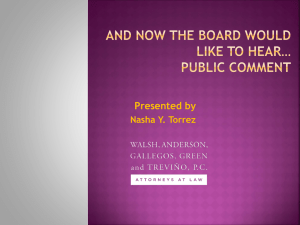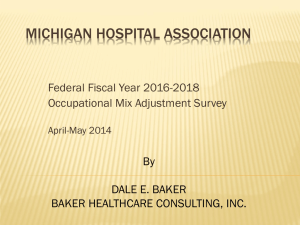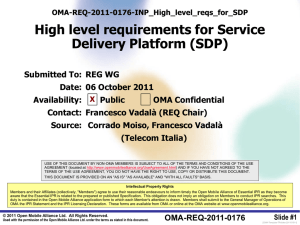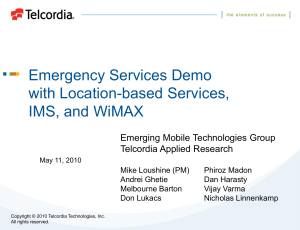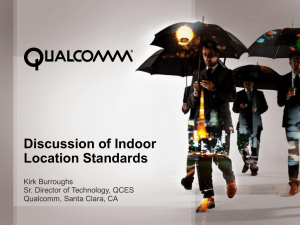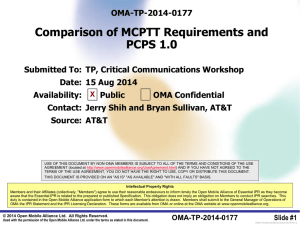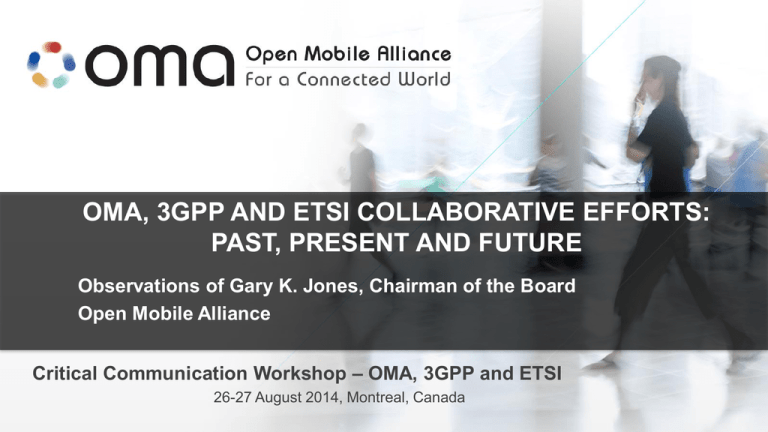
OMA, 3GPP AND ETSI COLLABORATIVE EFFORTS:
PAST, PRESENT AND FUTURE
Observations of Gary K. Jones, Chairman of the Board
Open Mobile Alliance
Critical Communication Workshop – OMA, 3GPP and ETSI
26-27 August 2014, Montreal, Canada
WELCOME TO THE
CRITICAL COMMUNICATION WORKSHOP
The information in this presentation is public.
|
Copyright © 2014 Open Mobile Alliance Ltd. All rights reserved.
ABOUT OMA
For over 10 years, OMA has been the premier international Standards
Development Organization (SDO) for developing mobile service enablers
OMA develops Service Enablers and APIs in the areas of
Communications, Content Delivery, Device Management, Location
OMA Service Enablers and APIs allow developers to
deploy a wide range of device and network functions in a
way that ensures operator networks and devices will
respond in a predictable fashion
OMA enablers are utilized across multiple vertical
markets (i.e., DM has commercial application in Mobile and
Automotive)
The information in this presentation is public.
|
Copyright © 2014 Open Mobile Alliance Ltd. All rights reserved.
SIGNIFICANT BODY OF WORK
OMA Application Layer Security Common
Functions
OMA Delta Record Management Object
OMA Gateway Management Object (GwMO)
OMA Maintenance of Requirements for
Privacy for Mobile Services
OMA OneAPI Profile of the Parlay X SOAP
Web Services
OMA RESTful Network API for WebRTC
Signaling
OMA Smartcard Web Server
OMA Authorisation Framework for Network
APIs
OMA Device Capability Management Object
OMA General Service Subscription
Management
OMA Management Object Design Guidelines
OMA Online Certificate Status Protocol Mobile
OMA RESTful Network API Common
Profile
OMA SOAP Network API Roaming
Provisioning;
OMA Social Network Web
OMA Browsing
OMA Device Management
OMA Global Service Architecture
OMA Management Policy MO
OMA Open Connection Manager API
(OpenCMAPI)
OMA RESTful Network API for Converged
Address Book
OMA Rich Communication Centre (RCC)
OMA Software Component Management
Object
OMA Browser Management Object
Device Management Client Side API
framework
OMA Global Permissions Management
OMA Messaging Services Interworking
OMA Parlay/OSA in OSE (PIOSE)
OMA RESTful Network API for Customer
Profile
OMA Rich Media Environment
OMA Software and Application Control
Management Object
OMA Browser Protocol Stack
OMA Device Management Connectivity
Management Objects (ConnMO)
OMA Parlay Service Access (PSA)
OMA RESTful Network API for Device
Capabilities
OMA Rights Issuer Common Domain
OMA SyncML Common Specification
OMA Policy Evaluation, Enforcement and
Management Architecture
OMA RESTful Network API File Transfer
RCS1.2 Deployment Suite 1.0
OMA SyncML Primer
OMA Immersive Social Centre (ISC)
OMA Categorization Based Content Screening
OMA Device Management Scheduling
Framework
OMA Mobile Advertising
OMA Instant Messaging and Presence Service OMA Mobile Broadcast Services
OMA RESTful Network API Chat
OMA Charging
OMA Device Management Smart Card
OMA IMPS V1.3 Implementation Guidelines
OMA Mobile Augmented Reality (MobAr)
OMA Presence SIMPLE
OMA RESTful Network API for Image Share
OMA Scalable Vector Graphics (SVG) Mobile
OMA Standard Transcoding Interface
Domain
OMA Charging Data
OMA Device Profile Evolution
OMA Identity Management Framework
OMA Mobile Codes
OMA Presence SIMPLE Data Extensions
OMA RESTful Network API for Messaging
OMA Secure Content Exchange
OMA Client Provisioning
OMA Diagnostics and Monitoring
OMA In-Game Communications
OMA Mobile Domain SMIL
OMA Presence Access Layer
OMA RESTful Network API for Notification
Channel
OMA Secure Content Identification Mechanism OMA Unified Virtual Experience
OMA Client Side Content Screening
Framework
OMA Digital Rights Management
OMA In-Game Advertising
OMA Mobile Email
OMA Provisioning Objects - Device
Management Application Characteristics
Management Object (AC_MO)
OMA RESTful Network API for OMA Push
OMA Secure Removable Media
OMA Client Side Enabler API
OMA Domain Name System
OMA IP Multimedia Subsystem
OMA Mobile Gaming Evolution
OMA Push
OMA OneAPI Profile of RESTful Network APIs OMA Secure User Plane Location
OMA User Agent Profile
OMA Condition Based URIs Selection
OMA Download over the Air
OMA Key Performance Indicators in OMA
OMA Mobile Location Protocol
OMA Push to talk over Cellular
OMA RESTful Network API for Payment
OMA SUPL Configuration Services
OMA UAProf Best Practices Guide
OMA Content Management Interface
OMA Dynamic Content Delivery
OMA DM List of supported Management
Object (ListMO)
OMA Mobile Location Service
OMA RCS Profile of RESTful Network APIs
OMA RESTful Network API for Presence
OMA Service Environment
OMA Virtualisation
OMA Converged Address Book
OMA Dynamic Navigation
OMA LightweightM2M (LWM2M)
OMA Mobile Search Framework
OMA RCS-e Profile of RESTful Network APIs
OMA RESTful Network API Capability
Discovery
OMA Converged IP Messaging
OMA Email Notification
OMA Lock And Wipe Management Object
(LAWMO)
OMA Mobile Spam Reporting
OMA RESTful Bindings for Parlay X Web
Services
OMA RESTful Network API for Roaming
OMA Service User Profile Management
OMA Telecom Application Store (TAS)
OMA URI Schemes
OMA vObject Minimum Interoperability Profile
OMA Service Provider Environment (OSPE)
OMA WAP Proxy-based Redirect
OMA Converged Personal Network Service
OMA Enhanced Visual Voice Mail
OMA Location Enabler Release
OMA Multimodal and Multi-device
OMA Guidelines for RESTful Network
OMA RESTful Network API for Terminal
Location
OMA Customized Multimedia Ringing
OMA External Functionality Interface
OMA Location in SIP/IP core
OMA Multimedia Messaging Service
OMA RESTful Network API for Address Book
OMA RESTful Network API for Terminal Status
OMA Simplified Converged Address Book (SOMA Web Services
CAB)
OMA Look and Feel Customization
OMA Next Generation Services Interface
OMA RESTful Network API for Anonymous
Customer Reference Management
OMA RESTful Network API for Short
Messaging
OMA SIMPLE IM
OMA LPP Extenstions (LPPe)
OMA Next Generation Services InterfaceSOAP (NGSI-S)
OMA RESTful Network API for Audio Call
OMA RESTful Network API for Third Party Call OMA SIP Push
OMA Device Apps Network Efficiency (DANE) OMA Firmware Update Management Object
OMA Web Runtime API (WRAPI)
OMA Web Services Network Identity
OMA Data Objects
OMA Games Services API
OMA Data Synchronization
OMA Games Services Client Server Interface OMA M2M Device Classification
OMA On-Board Key Generation
OMA RESTful Network API for Call Notification OMA RESTful Network API for Video Share
OMA Small Cells Capabilities Exposure
OMA XML Document Management
REST NetAPI QoS
REST NetAPI RCS
REST NetAPI NMS
Smart Card Technology
Security
Management Policy
Smart Access Interface
NFV/SDN-Layer 7 Impact
2D Barcodes
Open CMAPI
Location - MLS (ILA)
Wearables
Healthcare/Wellness APIs
Push to Communicate for PS
174 distinct Enablers in our portfolio
OMA Wireless Public Key Infrastructure
STANDARDS ENABLE MOBILE OPERATORS TO OFFER STRONG
SERVICES FOR PUBLIC SAFETY NETWORKS
Critical Communications has many stakeholders and relies on many
technologies. It crosses national standards boundaries, air interfaces
and regulatory administrations, and is by its very nature going to
require a large and effective normative referencing and liaising
function.
Today, Public Safety services are most commonly
provided through regional Public Safety standards
including TETRA and P25 that provide features not
previously supported in commercial mobile systems
The information in this presentation is public.
|
Copyright © 2014 Open Mobile Alliance Ltd. All rights reserved.
STANDARDS ENABLE MOBILE OPERATORS TO OFFER STRONG
SERVICES FOR PUBLIC SAFETY NETWORKS
There is a growing industry support for the use of
commercial broadband technology, including LTE, both
from private and shared commercial range for Public
Safety networks and services
A multi-stakeholder, standards-based approach will help to
bring interoperability between different vendors leading to a
competitive global equipment market.
The information in this presentation is public.
|
Copyright © 2014 Open Mobile Alliance Ltd. All rights reserved.
OMA PUSH TO TALK OVER CELLULAR (POC)
OMA POC specifies a form of communications that allows users to
engage in immediate communication with one or more users (“walkietalkie”-like) in the way that by pressing a button, a talk session with an
individual user or a broadcast to a group of participants is initiated.
OMA PoC V2.1 (published as Approved in 2011) allows Audio (e.g. speech,
music), Video (without Audio), still image, text (formatted and nonformatted) and file sharing with a single recipient (1-to-1) or among
multiple recipients in a group (1-to-many)
The information in this presentation is public.
|
Copyright © 2014 Open Mobile Alliance Ltd. All rights reserved.
OMA PUSH TO TALK OVER CELLULAR (POC)
The most-prominent US commercial deployments of OMA PoC is
AT&T's Enhanced Push-to-Talk, launched in November 2012. Another
commercial deployment is Bell Mobility's Next Generation Push-to-Talk
in Canada, launched in April 2012. Verizon has also deployed PoC 2.0
recently.
All these networks are powered by Kodiak Networks (compliant with OMA
PoC V2.0)
The information in this presentation is public.
|
Copyright © 2014 Open Mobile Alliance Ltd. All rights reserved.
OMA and 3GPP have a long standing and fruitful collaboration, mainly
based on liaison exchange
The information in this presentation is public.
|
Copyright © 2014 Open Mobile Alliance Ltd. All rights reserved.
… as well as OMA and ETSI (e.g. the IoT Plugtests in November 2013)
The information in this presentation is public.
|
Copyright © 2014 Open Mobile Alliance Ltd. All rights reserved.
OBSERVATIONS ON PCPS/MCPTT
3GPP is the source of requirements:
OMA is not creating unique requirements for Push to Communicate for Public
Safety (PCPS). It is taking requirements from 3GPP.
This is a well-established practice between OMA and 3GPP that has been refined
in over 10 years of Liaison and joint meeting activity.
Re-use is practical:
Collaboration between OMA and 3GPP appears to be the most practical approach.
OMA owns an existing, deployed specification for Push to Talk in OMA PoC and
remains the source of expertise. Retaining normative referencing with OMA retains
the continuity of FRAND IPR licensing from the original contributors.
Failure to collaborate with OMA may require 3GPP to create an entirely new
implementation of PoC.
The information in this presentation is public.
|
Copyright © 2014 Open Mobile Alliance Ltd. All rights reserved.
OBSERVATIONS ON PCPS/MCPTT
Improves organizational capacity:
Companies who participate in both 3GPP and OMA may alleviate 3GPP delegates
load by off-loading Service Layer work to OMA attendees. This may ultimately benefit
the timeliness of the final product.
Government participation:
A Government Agency may participate in OMA through Government Agency (GA)
Participant program directly without any membership fees.
With the implementation of “hybrid” meetings, it is now possible to fully participate in
an OMA working group remotely.
The information in this presentation is public.
|
Copyright © 2014 Open Mobile Alliance Ltd. All rights reserved.
OBSERVATIONS ON PCPS/MCPTT
Good organizational matching:
Both OMA and 3GPP are internationally chartered organizations with members from
all regions.
Our standards development process is similar, we have similar IPR licensing policies,
and we have the ability to normatively reference each other’s specifications.
OMA is the best and the strongest standards development environment for Critical
Communications application layer standards that will work with 3GPP LTE standards
optimizations and enhancements at the network layer.
Cooperation and collaboration sets up a workable process for future adaptation of
other service layer enablers relevant to critical communications.
The information in this presentation is public.
|
Copyright © 2014 Open Mobile Alliance Ltd. All rights reserved.
OBSERVATIONS ON PCPS/MCPTT
Appears to meet the needs of Public Safety evolution from
narrowband to broadband networks:
The Public Safety work ongoing at OMA is evolving PoC, that was developed
collaboratively with 3GPP and is deployed commercially in the market, e.g. in the
U.S and Canada, to PCPS (Push to Communicate for Public Safety).
OMA PCPS will be ready to incorporate Public Safety requirements and deliver
application standards that will operate with any transport technology, on any
private, commercial or private-commercial networks, and can easily interoperate
with current narrowband and other current Public Safety networks, command and
control centers, and databases, etc.
The information in this presentation is public.
|
Copyright © 2014 Open Mobile Alliance Ltd. All rights reserved.
OBSERVATIONS ON PCPS/MCPTT
Setting the stage - OMA PCPS is only the first enabler:
The focus today in OMA is PoC and its enhancement to PCPS.
However, OMA has important specifications for Location services, Presence
services, Device Management, and others that may be required in future versions
of Critical Communications.
Re-use of existing specifications will ensure mature, tested technologies that
underlie Critical Communications services.
Establishing the working practices with PCPS/MCPTT today ensure continuity as
future enhancements are rolled out.
The information in this presentation is public.
|
Copyright © 2014 Open Mobile Alliance Ltd. All rights reserved.
ESTABLISHING THE CRITICAL COMMUNICATIONS ECOSYSTEM
Critical Communications has many stakeholders and relies on many
technologies. It crosses national standards boundaries, air interfaces and
regulatory administrations, and is by its very nature going to require a large
and effective collaboration and normative referencing function.
It is vitally important foster the operational backbone of technical
collaboration now. Effective collaboration is the important part of this debate,
not the specifics of POC.
Everyone will benefit if the first order of business is to figure out how to have
an effective “big tent” approach.
Failure of the ecosystem will ultimately slow the progress of Critical
Communications more than any specific technical decision.
The information in this presentation is public.
|
Copyright © 2014 Open Mobile Alliance Ltd. All rights reserved.
CONCLUSION
3GPP is encouraged to endorse a process that includes OMA,
and others, as a collaborator making technical contributions by
normative reference in the area of PCPS/MCPTT and other
future Critical Communications work.
The information in this presentation is public.
|
Copyright © 2014 Open Mobile Alliance Ltd. All rights reserved.
THANK YOU!
Gary K. Jones
Chairman OMA

